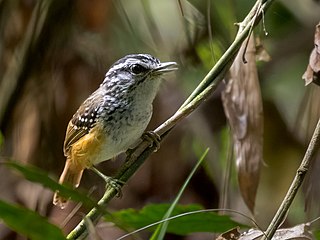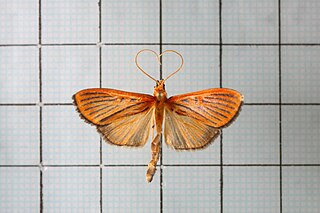
The black sea bass is a species of marine ray-finned fish, a sea bass from the subfamily Serraninae which is part of the family Serranidae, which also includes the groupers and anthias. It is found in the western Atlantic Ocean, where it is an important species for commercial and recreational fisheries.

The striated heron also known as mangrove heron, little green heron or green-backed heron, is a small heron, about 44 cm tall. Striated herons are mostly sedentary and noted for some interesting behavioral traits. Their breeding habitat is small wetlands in the Old World tropics from west Africa to Japan and Australia, and in South America and the Caribbean. Vagrants have been recorded on Oceanic islands, such as Chuuk and Yap in the Federated States of Micronesia, the Marianas and Palau; the bird recorded on Yap on February 25, 1991, was from a continental Asian rather than from a Melanesian population, while the origin of the bird seen on Palau on May 3, 2005 was not clear.

The jungle babbler is a member of the family Leiothrichidae found in the Indian subcontinent. Jungle babblers are gregarious birds that forage in small groups of six to ten birds, a habit that has given them the popular name of "Seven Sisters" in urban Northern India, and in Bengali, with cognates in other regional languages which also mean "seven brothers".

The eastern chipmunk is a chipmunk species found in eastern North America. It is the only living member of the chipmunk genus Tamias.

Channa striata, the striped snakehead, is a species of snakehead fish. It is also known as the common snakehead, chevron snakehead, or snakehead murrel and generally referred simply as mudfish. It is native to South and Southeast Asia, and has been introduced to some Pacific Islands. Reports from Madagascar and Hawaii are misidentifications of C. maculata.

Agrotis is a genus of moths of the family Noctuidae. The genus was erected by Ferdinand Ochsenheimer in 1816. A number of the species of this genus are extinct.

The bristled grassbird is a small passerine bird in the genus Schoenicola. Also known as the bristled grass warbler, this species is endemic to the Indian subcontinent, where it is patchily distributed in Bangladesh, India, Nepal and Pakistan. These insectivorous birds skulk in dense and tall grasslands, often in marshy areas, habitats that are threatened by human activities. Formerly considered to be sedentary, the species may be migratory, moving south and east in the Indian peninsula during winter and returning to their breeding grounds in the northern plains south of the Himalayas.

The striated starling is a species of starling in the family Sturnidae. It is endemic to New Caledonia.

The striated laughingthrush is a passerine bird in the family Leiothrichidae. It was at one time placed in the genus Garrulax but following the publication of a comprehensive molecular phylogenetic study in 2018, it was moved to be the only species in the resurrected genus Grammatoptila.
Barsine is a genus of moths in the family Erebidae.

Spix's warbling antbird is a species of bird in the family Thamnophilidae.

Miltochrista is a genus of moths of the family Erebidae, subfamily Arctiinae. The genus was erected by Jacob Hübner in 1819.

Mecyna is a genus of moths of the family Crambidae. The genus was first described by Henry Doubleday in 1849.
Peribona is a monotypic moth genus of the family Crambidae described by Pieter Cornelius Tobias Snellen in 1895. It contains only one species, Peribona venosa, described by Arthur Gardiner Butler in 1889, which is found in the Himalayas and on Java.

Tyspanodes is a genus of moths of the family Crambidae described by William Warren in 1891.

Laelia is a genus of tussock moths in the family Erebidae. The genus was described by Stephens in 1828. Species are well distributed throughout Europe, Japan, China, India, Sri Lanka, Myanmar and Java.

Kummerowia striata is a species of flowering plant in the legume family known by the common names Japanese clover and common lespedeza. It is native to much of Asia and it is present in the eastern United States as an introduced species.
Trichophysetis cretacea, the jasmine bud borer, is a moth in the family Crambidae described by Arthur Gardiner Butler in 1879. It is found in Japan, Russia and China.

Tyspanodes linealis is a moth in the family Crambidae. It was described by Frederic Moore in 1867. It is found in the Bhutan, the Himalayas, Sri Lanka, the Andamans, Thailand and Australia, where it has been recorded from Queensland.
















